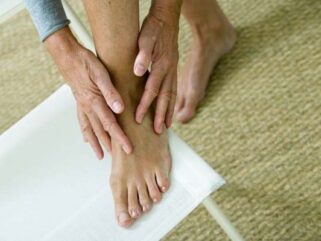Gout is a form of arthritis that occurs as a result of the build-up of uric acid in the body particularly in the joints. This accumulation of uric acid typically occurs when the body has difficulty processing certain protein substances called purines that are found naturally in our diets.
The actual build-up of uric acid can result when the body has difficulty eliminating uric acid through the kidneys and urine, or in some cases, when the body produces too much uric acid. The tendency to accumulate uric acid is often hereditary.
It can, however, skip an individual or even a generation and re-appear on the descendants of someone who has no signs of gout. Gout is commonly seen among males between fifty and sixty years of age.
Gout usually starts with a sudden onset of intense pain in one or more joints, usually the big toe joint of the foot. The pain is accompanied by redness, swelling and, warmness over the joint. Many patients say they feel the pain in the middle of the night or upon rising in the morning.
Diagnosis will be based on the personal and family history as well as on the podiatrist’s examination of the patient. Blood tests are often performed to determine uric acid levels. The joint fluids are examined to check if there is a presence of uric acid crystals. X-rays may also be performed to examine both the bones and joints, and check out abnormal changes associated with gout.
Treatment
The treatment of gout starts with establishing the correct diagnosis. Oral anti-inflammatory medications are often used to manage the acute attack. If the gout attack is in the toe, it will typically help to elevate the foot, avoid standing and walking, and wear only a loose slippers until the individual can be seen by a podiatrist.
If gout attacks continue despite medical treatment, if there are excessive deposits of gouty crystals within a joint, or if arthritis causes continual discomfort, surgical treatment may be necessary to remove the crystals (tophi) and repair the joint.
Prevention
Certain foods that are high in purines can increase uric acid levels, and thus bring on an acute attack of gout. These foods include red meats, shellfish, beer, red wine, and salt. Some medications, such as diuretics (water pills) that are often used to control high blood pressure or reduce swelling, may also cause an acute attack of gout. Stress, infection, and trauma are also possible causes of gout
Drinking 6-8 glasses of water each day, eating an appropriate diet, and evaluating current medications will reduce the likelihood of an attack or lessen the severity should it occur. If you have a personal or family history of gout, regular examinations by a podiatrist will help in reducing the scenario of a gout attack.


